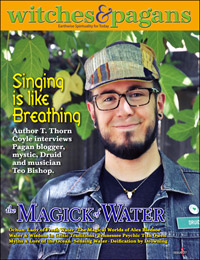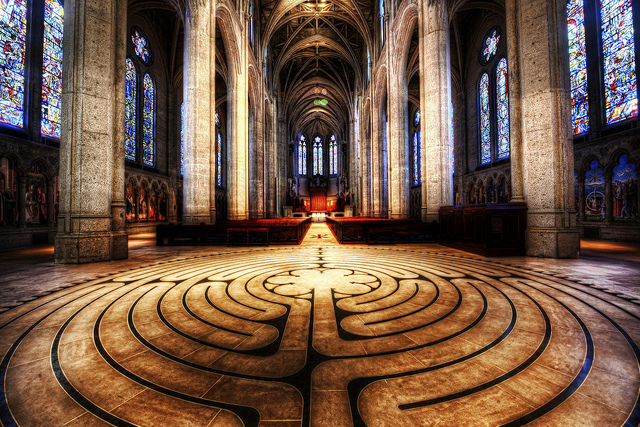Samhain is a time to let go of the things that no longer serve us. It’s a moment when we look back on the year, perhaps even the over-arching patterns of our lives, and we reevaluate. We ask ourselves what needs to be burned in the fire in order for us to move forward with a clean conscience and a clear mind. Then, often quite literally, we write that thing down on a slip of paper and we set it ablaze.
This year at Samhain I’m coming to terms with the realization that Paganism, itself, does not serve me in the way that I thought it did. Stranger even, I’m feeling pulled back to the Episcopal Church, to the God of Christianity, and to Jesus.
The timing of this couldn’t be more disruptive and inconvenient.
 It would have been easier if this hadn’t happened; if I could have gone on to build a name and reputation as a writer and thinker in the Pagan community. It would be easier if I could savor in the experience of being on the cover of a Pagan magazine for the first time, rather than looking at it and thinking, “Oh, print… if you could only move as fast as we all evolve.” It would be easier if I didn’t have to try and navigate and negotiate my language around all of this. I don’t like offending people, and I anticipate that there will be plenty of people who will feel (if they don’t already) betrayed by this change of course.
It would have been easier if this hadn’t happened; if I could have gone on to build a name and reputation as a writer and thinker in the Pagan community. It would be easier if I could savor in the experience of being on the cover of a Pagan magazine for the first time, rather than looking at it and thinking, “Oh, print… if you could only move as fast as we all evolve.” It would be easier if I didn’t have to try and navigate and negotiate my language around all of this. I don’t like offending people, and I anticipate that there will be plenty of people who will feel (if they don’t already) betrayed by this change of course.
But an authentic spiritual life is rarely, if ever, easy.
Answering the call of a God is not supposed to be convenient. When I felt touched by the Morrigan I had no idea the kind of disruption that would be forthcoming in my personal life. It was a serious rough patch. I wasn’t called into her service as some of my other friends have been, but she certainly made a mark on me.
And this feels even more encompassing than that ritual awakening at Pantheacon. This is even more immediate and intimate, albeit a little less war-like. Simply put, I’m feeling called back to the worship of God in Christ, and I can’t deny it even if I wanted to.
Let me make it clear that saying these kinds of things about God or Jesus — this overtly Jesus-y language — is not something I feel comfortable with. It feels unnatural to me, and foreign even to my upbringing in the Episcopal Church. Never in my time as a Christian did I casually state things about my “relationship to God”.
Ugh… the Personal Relationship to God Pushers were the worst. Their casual familiarity with God was unnerving to me, I had a similar feeling of discomfort when I heard hard polytheists talk about their Gods such certainty and immediacy.
But here’s the crazy thing: I get the hard polytheists now. I feel like coming to understand their relationship to their Gods has provided me with a context to understand this immediate relationship I’m experiencing with God in Christ. Galina Krassova certainly never intended to be an example for how a former-Christian might develop an newly imitate and personal relationship with the God of Abraham, but such is the way.
I cannot deny how my experiences within the Pagan community have changed my perspective.
- I am more acutely aware now that there are many ways of conceiving of the divine, and that none of us has the One Truth.
- I’ve been able to see the ways in which the Church is broken, but also the ways in which the Pagan communities’ resistance to institutions is also broken. It’s hard to build community no matter who you are.
- I think the polytheists who are seeking to build complete, clearly defined religious practices will see their religious traditions outliving those of the more free-for-all types of Pagans. But I also think that the polytheists could become so niche that they are seen as irrelevant.
- In moments I have been unclear about how Paganism is relevant, and asking the question “How is Paganism relevant” can raise hackles. But I think it’s a question that needs to be asked again and again and again.
If I’ve learned anything during the last several years it is that admitting one’s own ignorance and asking questions of others can lead to the most profound exchanges. Time and time again I have read the words of people who have strong convictions about their spiritual and religious lives. They have the clear sense that they are doing what is most in line with their spirit, their inner nature, the will of their Gods. Christians have a great deal of practice at practicing conviction. I think that Pagans, if they feel a conviction around their religious lives, should speak that aloud in as clear a tone as possible.
Perhaps my journey will evolve into a kind of Christo-Paganism. I don’t know. Perhaps I’ll find, as some other people have done, a balance of traditions. My practice may reflect certain elements of the Pagan sensibility (which would be natural, because these sensibilities feel very natural to me) while developing a practice of worship and study that is informed by the Gospel. Perhaps there’s a way to balance it all.
Or, as some have already warned me, I may have to make a choice.
But I can’t know that now. In fact, I really have no idea how this will continue to play out. All I can do is continue to write through it, and to seek to be as honest as I can about my experiences. I’ll continue to do that here on the Wild Hunt and on Bishop in the Grove. I’ll also be seeking out connection to people on Twitter — it seems to be the forum which is most conducive to concise, intentional idea-sharing.
And I’ll probably light a candle to Jesus, and one to Brighid, and give thanks for whatever guidance can be provided to me. I will pray, and I will go to church (ritual), and I will listen quietly. I will not stop respecting those who are different than me. I will practice kindness and revel in the mystery of life’s unfolding.
The Wild Hunt is not responsible for links to external content.
To join a conversation on this post:
Visit our The Wild Hunt subreddit! Point your favorite browser to https://www.reddit.com/r/The_Wild_Hunt_News/, then click “JOIN”. Make sure to click the bell, too, to be notified of new articles posted to our subreddit.

